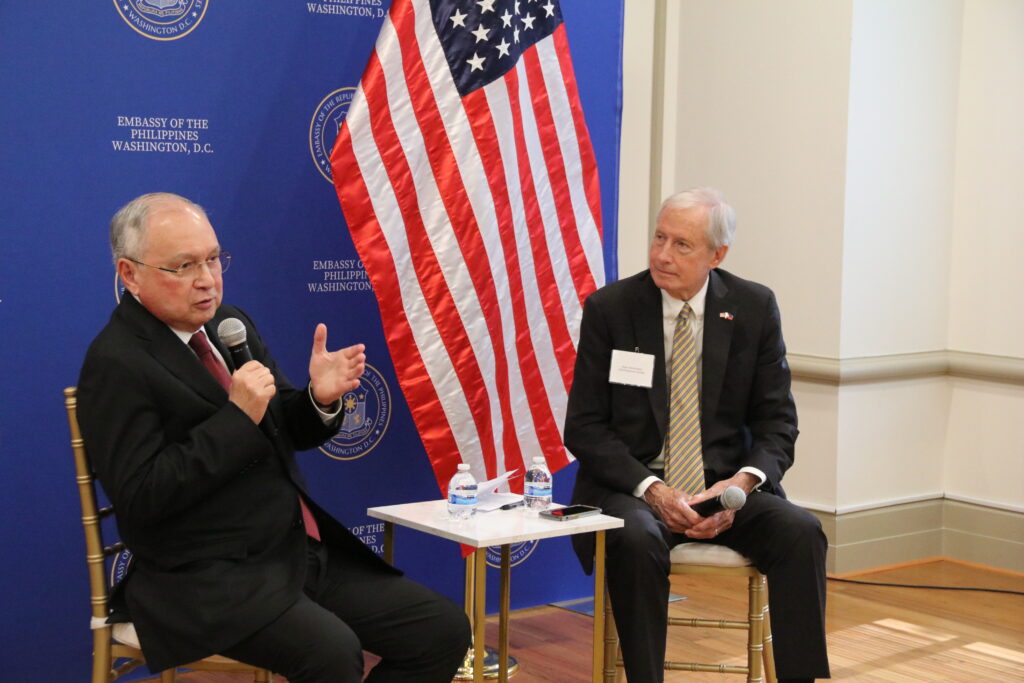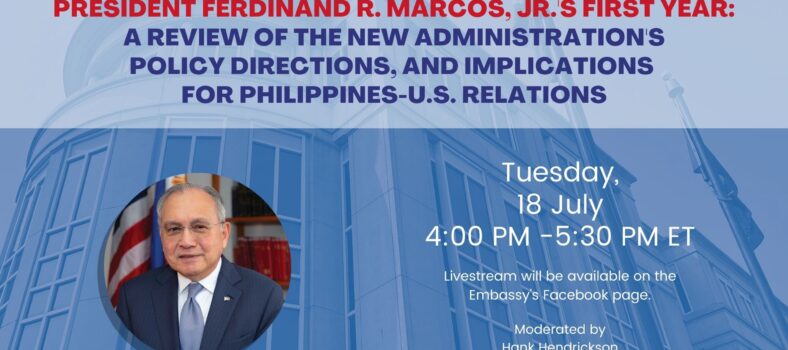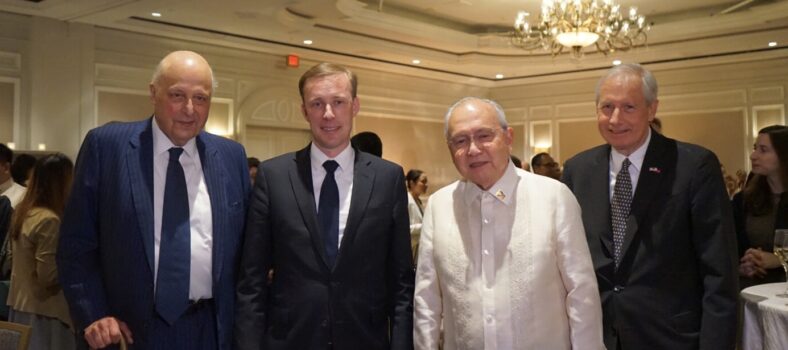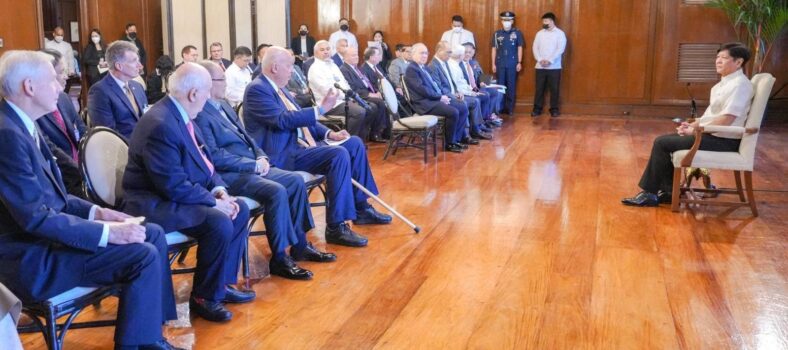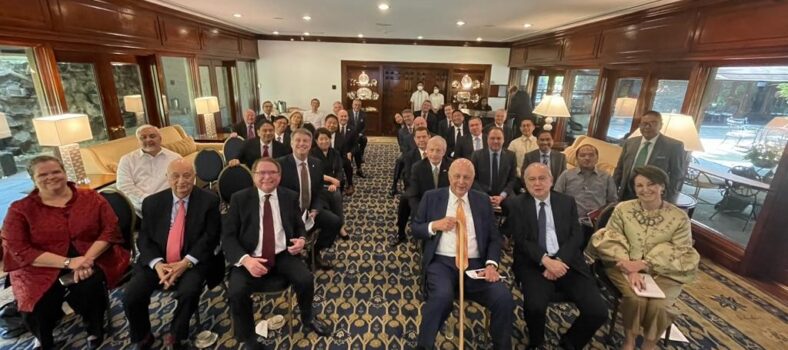Highlights of President Marcos Jr Administration’s First Year: PH-US Relations
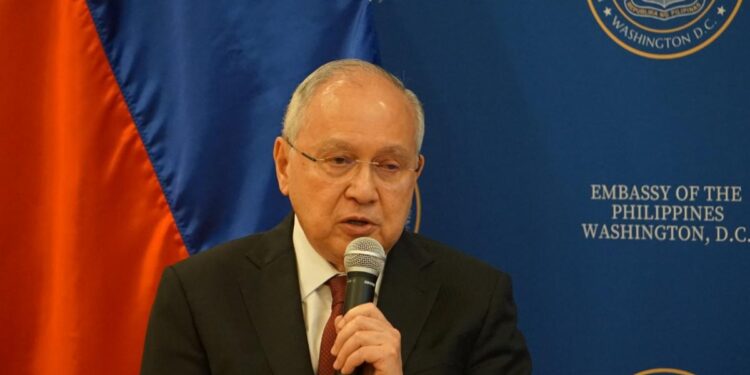
At a July 18 forum held at the Philippine Embassy in Washington DC, Philippine Ambassador Jose Manuel Romualdez reviewed the first year of the new Marcos administration, focusing on foreign policy, PH-US relations, regional and global issues. President Marcos Jr. laid out his administration’s foreign policy objectives during his first State of the Nation Address in July last year, and at the UN General Assembly in September 2022, stating that “the Philippines is a friend to all, an enemy to none.” The president continues to describe the Philippines as “a responsible member of the international community, firmly committed to promoting friendship and cooperation with all countries that share the same interests, values and principles.”
On the West Philippine Sea, the Philippines’ legal claims and actions are anchored on the UN Convention on the Law of the Sea (UNCLOS), the 2016 Arbitral Award, and the Philippines-sponsored Manila Declaration on the Peaceful Settlement of International Disputes by the United Nations General Assembly on November 1982.
“I will not preside over any process that will abandon even one square inch of territory of the Republic of the Philippines to any foreign power,” President Marcos Jr proclaimed asserting Philippine territorial rights.
Ambassador Romualdez reviewed recent highlights in PH-US relations under the Marcos Jr. Administration, which welcomed high-level visits by U.S. Vice President Kamala Harris, State Secretary Antony Blinken, Defense Secretary Lloyd Austin, and resumed the Two-Plus-Two Ministerial dialogue in Washington, along with two-way exchanges between legislative and economic officials. These reinvigorated exchanges capped by President Marcos, Jr’s successful official visit to Washington in May generated two-way economic and security benefits, and signaled a commitment to strengthen the relationship.
On the PH-US security and defense alliance that has grown by “leaps and bounds,” the April 2023 Balikatan exercise expanded from 9,000 troops to 17,000 military personnel. After bilateral talks at the White House in May, the leaders announced the adoption of Bilateral Defense Guidelines, which according to Amb Romualdez are “expected to institutionalize key priorities, mechanisms and processes to deepen alliance, cooperation and interoperability.”
A host of other deliverables included the identification of four new EDCA sites and the acceleration of the implementation of EDCA projects, and strengthening cooperation among PH-US coast guards serving the national security interests of both countries.
Amb Romualdez pointed out that a majority of Filipinos favor a strengthened PH-US defense alliance, according to a June 19-23, 2023 Pulse Asia Survey. Findings revealed that 74 percent of Filipino respondents are in favor of strengthening PH-US military ties amid security tensions in the West Philippine Sea.
On the economic front, Amb Romualdez reported that President Marcos Jr’s visit generated more than $3 billion in public and private investment pledges from the United States in key priority areas including the expansion of IT-BPM services by Optum, bringing technology to manufacture advance solar cells by Maxeon, semiconductor research facility by Analog Devices, and expansion of commercial operations in the Philippines by Moderna. The Philippines participates in the U.S-led Indo-Pacific Economic Framework and continues to pursue the reauthorization of the Generalized System of Preferences, and advance negotiations for a free trade agreement.
To enhance cooperation on education, research and training, both countries announced a new U.S.-Philippines Friendship Fellowship and expanded exchanges under the 75-year Fulbright Scholarship Program in the Philippines.
Following his remarks, Ambassador Romualdez fielded questions from the audience representing American businesses and the visiting American Chamber of Commerce Philippines, U.S. government, academe, press, and members of the US-Philippines Society, led by Co-Chair Amb John D. Negroponte, Amb Thomas C. Hubbard and Amb John F. Maisto. Topics included EDCA, China relations, infrastructure priorities, express Green Lane for foreign investors, upcoming White House Trade and Investment Mission to the Philippines, outlook for artificial intelligence, rehabilitation-focused approach to the drug war, and reducing corruption.
In closing remarks, Society President Ambassador John F. Maisto provided his observations on the leadership style of President Ferdinand Marcos, Jr. stating that the President “knows how to engage with the United States. Something I commented to him personally. He has a good feel for this country; I consider it smart engaging, and that leads to the kind of bilateral relationship we need.”
“Encouraged by positive developments, the challenge is the need to follow through,” Amb Maisto added.
The pre-SONA program was organized by the US-Philippine Society in cooperation with the Philippine Embassy in Washington DC. Executive Director Hank Hendrickson moderated the discussion.

